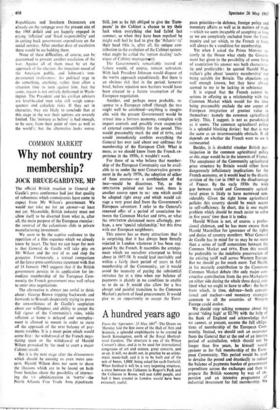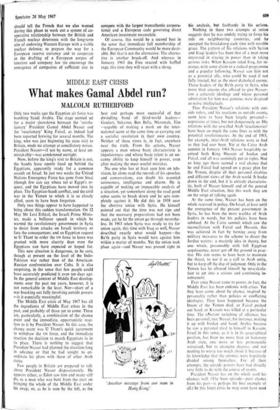Why not country membership?
COMMON MARKET JOCK BRUCE-GARDYNE, MP
The official British reaction to General de Gaulle's press conference had just that quality of robustness which connoisseurs have come to expect from Mr Wilson's government. We would not take no for an answer—at least not yet. Meanwhile, British industry must not allow itself to be diverted from what is, after all, the main purpose of the European exercise: the reversal of the calamitous slide in private manufacturing investment.
We seem to be the captive audience to the repetition of a film sequence which we already know by heart. The best we can hope for now is that General de Gaulle will take pity on Mr Wilson and the rest of us and stop the projector. Fortunately, a textual comparison of the latest press conference statement with that of 14 January 1963 suggests that if the British government persists in its application for im- mediate membership of the European Com- munity the French government may well refuse to enter into negotiations.
The alternative is almost too awful to think about: George Brown tripping backwards and forwards to Brussels desperately trying to prove the unworthiness of de Gaulle's scepticism about our willingness and ability to accept the full rigour of the Community's rules, while reflation at home is delayed and unemploy- ment is allowed to mount in order to stave off the approach of the next balance of pay- ments troubles. It is a moot point which would come first: the withdrawal of the French nego- tiating team or the withdrawal of Harold Wilson provoked by the need to avert a major Cabinet revolt.
But it is the next stage after the denouement which should be causing us even more con- cern. Harold Wilson does not seem to share the illusions which are to be found on both front benches about the possibility of interest- ing the us administration in `NAFTA'—,the North Atlantic Free Trade Area pipedream.
Still, just as he felt obliged to give the `Euro- peans' in the Cabinet a chance to try their luck when everything else had failed last summer, so when they have been repulsed he might well feel he had to give the `Atlantic'sts' their head (this is, after all, his unique con- tribution to the evolution of the Cabinet system: what might be called the `option dealing' tech- nique of Cabinet management).
The Government's remarkable record of failure would, of course, remain unbroken. With luck President Johnson would dispose of the NAFTA approach expeditiously. But there is an obvious risk that in the period, however brief, before rejection new barriers would have been created to a future resumption of the European negotiation.
Another, and perhaps more probable, re- sponse to a European rebuff (though the two might well be combined—anything is imagin- able with the present Government) would be retreat into a fortress economy, complete with import controls and possibly even suspension of external convertibility for the pound. This' would presumably mark the end of EFTA, and would immediately confirm everything the General has ever said about our unfitness for membership of the European Club. What is more, as we should know from the French. ex- perience in the 1950s, it wouldn't work.
For those of us who believe that member- ship of the European Community can be avail- able to us under the next Conservative govern- ment in the early 1970s, the adoption of either of these courses—or a combination of the two—would be disastrous. Yet, as the SPECTATOR pointed out last week, there is another course open to us: one which could be adopted right away and which would sal- vage a very great deal from the Government's European adventure. I refer to the General's renewed offer of a period of association be- tween the Common Market and EFTA, or what the SPECTATOR christened more alluringly, per- haps, a new 'special relationship,' but this time with our European neighbours.
This course has so many attractions that it is surprising that it has always been fiercely rejected in London whenever it has been sug- gested by the French. It resembles the arrange- ment which we ourselves attempted to bring about in 1957-58. It would lead inevitably and within a fairly short period of years to full membership of the Community, yet it would avoid the necessity of paying the substantial entrance fee at a time when our balance of payments is plainly in no condition to enable us to do so. It would also allow for a less abrupt and painful transition to the Common Market's pattern of food procurement. It would give us an opportunity to accept the Euro- pean priorities—in defence, foreign policy and monetary affairs as well as in matters of trade
—which we seem incapable of accepting so long as we are completely excluded from the Com- munity and yet which, to the French at least, will always be a condition for membership.
Yet when I asked the Prime Minister re- cently in the House what study the Govern- ment has given to the possibility of some form of association his answer was both characteris- tic and predictable: he quoted Harold Mac- millan's gibe about 'country membership' not being suitable for Britain. The objections are well enough known, but they have always seemed to me to be lacking in substance.
It is argued that the French cannot be serious in offering us a relationship with the Common Market which would for the time being presumably exclude the one aspect of European integration of greatest value to themselves: namely the common agricultural policy. This, I suggest, is not as paradoxical as it seems. The common agricultural policy is a splendid blocking device: but that is not the same as an insurmountable obstacle. It all depends on whether the French want to see it surmounted.
Besides, it is doubtful whether British par- ticipation in the common agricultural policy at this stage would be in the interests of France. The acceptance of the Community agricultural price structure by Britain would either have dangerously inflationary implications for the French economy, or it would lead to the drastic revision of the CAP in 1969 to the disadvantage of France. By the early 1970s the wide gap between world and Community agricul- tural prices is likely to have narrowed con- siderably. Given the right home agricultural policies this country should be much nearer to self-sufficiency. In short, this is one major problem which should be much easier to solve in five years' time than it is today.
Harold Wilson is not, of course, a profes- sional clubman, and he has more excuse than Harold Macmillan for ignorance of the rights and duties of country members. What General de Gaulle has in mind for us may be no more than a series of tariff concessions between the Common Market and EFTA. Even this would be preferable to the indefinite preservation of the existing tariff wall across Western Europe. But we should go for much more. Ted Heath, in his masterly contribution to the Commons Common Market debate (the only major con- structive contribution from the pro-Marketeers on either side during the whole three days), out- lined what we ought to have to offer: the basis from which, in time, defence—both conven- tional and nuclear—and monetary strategies common to all the countries of Western Europe could evolve.
We should stop talking nonsense about the pound 'riding high' at $2.79-1 with the help of the Bank of England and acknowledge that we cannot, at present, assume the full obliga- tions of membership of the European Com- munity. Instead, we should seek an assurance from the General that at the end of an interim period of assimilation, which should not be longer than five years, he himself would sponsor us for full membership of the Euro- pean Community. This period would be used to devalue the pound and drastically to reduce the balance of payments burden of government expenditure across the exchanges and then to prepare the British economy by way of ex- pansion and an intensive programme of industrial investment for full membership. We
should tell the French that we also wanted during this phase to work out a system of co- operative relationship between the British and French nuclear deterrents with the long-term aim of endowing Western Europe with a viable nuclear defence; to prepare the way for a European reserve currency and to cooperate in the drafting of a European corpus of taxation and company law (to encourage the emergence of companies of sufficient size to
compete with the largest transatlantic corpora- tions) and a. European code governing direct American investment meanwhile.
Of course, this would be a second best in the sense that immediate full membership of the European Community would be more desir- able. But that is not the alternative. The alterna- tive is another brush-off. And whereas in January 1963 the Five reacted with baffled rage, this time they will react with a shrug.



































 Previous page
Previous page